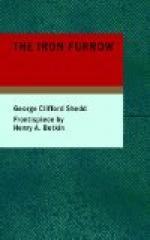The strange warmth continued. The temperature was not even down to freezing and the men, muddied and wet to the knees, dripped with perspiration, while the horses’ flanks were soaked with both sweat and melted snow. It was difficult to breathe, what with the heavy, oppressive air and what with the fall of suffocating snow, constantly growing thicker. Horses slipped and went down, but were raised again; fresnos were mired, but freed once more; men gave out and were sent to their camp. And the fight kept on.
But about eleven o’clock Bryant felt a cool puff of air on his cheeks, light and of brief duration. It was followed by a second, this time quicker and stronger, blowing from the northwest and sending the snow a-scurry in a slanting fog of flakes past the flames of the torches. He studied this change for a moment, then sought out Carrigan.
“Time to make a break for cover,” he announced. “Wind is coming and the devil will be to pay when once it picks up all this loose snow.”
“Well, we’re about at a standstill, anyway,” was the reply. “I’ll have the crews draw the scrapers and plows off at one side where we can get at them. I had a spare horse tent put at the disposal of the Mexicans, and have had men in both camps piling baled hay all evening around the big tents for windbreaks. We’ll issue extra blankets and crowd the crews into the shacks and mess quarters where there are stoves.”
“What about water if our pipe freezes?”
“Then the horses will eat snow like the range ponies, I guess—and the rest of us, too.”
At that he went off to order the work stopped, as did Bryant. For some time the wind blew only in those fitful puffs Lee had noted or died down entirely for short periods; and of this fact the night shift took advantage to assemble the fresnos and plows beside the canal and to drive their horses to shelter. The crews of the north camp, being fewer, got away first; and thither Bryant plowed through the snow with them to see all made safe. When he returned, Carrigan was just herding the last man and team toward the main camp. Together the contractor and the engineer extinguished the torches, then made their way, carrying a flare with them, toward the glow showing at the edge of the camp, where an oil-soaked bale of hay burned as a guide. At their backs the wind and snow blew with gradually increasing strength.
They made the rounds of the horse tents packed with animals, the mess tents packed with workmen—with those men only come and those newly aroused from sleep and gathered here—of the shacks, the hospital, the engineers’ headquarters and the big commissary tent, all crowded with white men and Mexicans, steaming with moisture, smoking cigarettes and pipes, giving off a rank smell of clay and human bodies and wet clothes and horses, who talked and laughed and waited restlessly. The pair waded around examining guy-ropes, stakes, the protective walls raised of hay bales. They took advantage of a sudden dropping of the wind to go among the small tents, thrusting their flares within each and having a look, to make certain no sleeper of the day shift had been overlooked. Then at last they stumbled up the street to Bryant’s shack.




